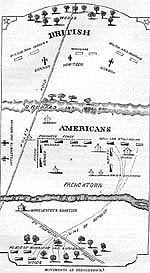
Map of the battle of the River Raisin
In the evening of the 21st January, General Procter came up with several hundred of the 41st Regiment, & the Newfoundland, & about five hundred warriors, principally Poutewattomies, Chippawas, & Ottawas, -- excepting about seventy Wyandots, -- the same number of Delawares, -- the party of Mingoes already mentioned. They marched towards the enemy in time to enable them to arrive there before the dawn of day; -- in forming for the attack, the regular troops took the centre, -- the Wyandots the Mingoes & the Delawares were on the right, and the Poutewattomies & Chippawas composed the left wing. The troops advanced against that part of the enemy that were under cover of a stockade garden-fence which was a sufficient cover from musketry, and opened fire upon them with great spirit, but in returning it, -- the enemy had a great advantage, because they were completely secure themselves, & our troops entirely exposed, the adjoining grounds forming a complete plain. At this time, the warriors of the right wing advancing rapidly, attacked a body of five or six hundred men, principally regulars, -- who had formed on the plain: -- the Wyandots were mostly mounted, -- they assailed them with such fury that the assault & defeat were almost at the same instant, & the pursuit was continued with such earnestness that very few escaped; -- they were all killed or taken, -- among the latter was General Winchester himself who had commanded this division in person. As soon as he was brought in prisoner, -- the Kentucky militia, who had defended the stockade garden fence, surrendered [as] prisoners of war ...